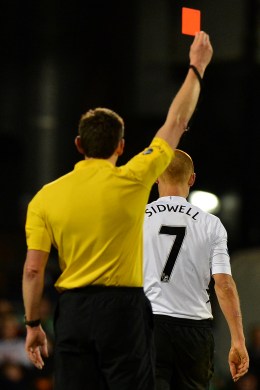
Referee Lee Probert (left) shows Fulham's English midfielder Steve Sidwell the red card during an English Premier League football match between Fulham and Queens Park Rangers, London, April 1, 2013.
You’ve got to have pretty thick skin to take a job where you spend the day being jeered at by thousands of irate fans and complained to by dozens of overpaid professional athletes. But as a new study shows, a healthy sense of superiority doesn’t hurt either.
According to the Telegraph, a recent psychological survey of pro soccer referees discovered that on the whole, they mostly think they are better than other refs — and use this feeling of superiority as a way to cope with the stress of their jobs.
The study, reported by The British Psychological Society, surveyed 11 officials from Britain’s Premier League and more than 180 county level referees.
The referees were asked to judge themselves in comparison to their colleagues, reported the Telegraph. The referees always ranked themselves as more skilled and competent in comparison. Other questions were about their reactions under pressure, and the positive and negative aspects of their job.
In order to face ear-blistering insults thrown at them by angry coaches, and endless criticism from their managers and the media, the older referees employed various strategies to keep stress at bay, explained the researchers to the Telegraph.
“Obviously not every referee can be better than every other ref,” Melissa Anderson, one of the researchers who conducted the study, told the Telegraph:
“More experienced referees are more likely to have learnt strategies to help them deal with the pressure or it could be that referees who are not able to do this drop out before they ever become experienced.”






